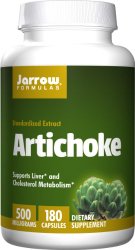$15.89
$15.89
(SAVE Now!)
as of 12/22/2024 (Details)
View larger Product Profile Originating in the Mediterranean region, the artichoke (Cynara cardunculus var. scolymus) is now cultivated around the globe. The botanical name is derived partly from the tradition of using ashes (Latin: cineris) as fertilizer and partly from the Greek skolymos, meaning ‘‘thistle’’. The immature buds of the plant consist of the edible bracts (commonly called leaves), which compose the “heart” and surround the immature florets, commonly called the “choke. ” The globe artichoke has been highlighted in traditional-medicine philosophies as a promoter of digestion and a supporter of liver and gallbladder function.* It is known to contain a wide array of bioactive components including luteolin, cynaroside (luteolin-7-O-glucoside), apigenin, inulin, and the caffeoylquinic acids such as chlorogenic acid and cynarin. In fact, many signs point to artichoke’s health benefits resulting from the confluence of many actives rather than the effects of just one. Modern biomedical science continues to decipher artichoke wisdom in many areas of health such as liver support, bile production, and cardiovascular strength.* Distinguishing Features: Standardized to 5% caffeoylquinic acids500 mg of leaf extract per capsule View larger Bile Protection And Liver Support Artichoke is commonly touted as a stimulator of bile production. And according to in vitro studies using rat liver tissue and hepatocytes, artichoke leaf extract does indeed support bile flow.* In animals, artichoke leaf extract has been found to support the production of bile acids and to aid in the digestion of lipids.* Bile is integral to digestion and the metabolic action of bile on cholesterol metabolism has been suggested to be the possible rational for the use of bile in ameliorating occasional digestive complaints.* Yet bile production occurs in the liver so it may not be a surprise that the liver is often broadly mentioned as a beneficiary of artichoke’s effects. The action of artichoke on the liver begins with bile, but it certainly doesn’t end there. Artichoke extracts help to protect the liver from various toxic assaults such as peroxides and carbon tetrachloride.* Artichoke’s benefits on liver are often attributed to the antioxidant activity of the caffeoylquinic acid phenolic compounds and flavonoids such as luteolin and apigenin. In vitro and in vivo studies have confirmed an antioxidant-related mechanism of protection.* Artichoke extract appears to be able to bulwark glutathione levels in the liver, when exposed to oxidative stress.* Downstream, glutathione depletion often leads to the increased peroxidation of lipids, including LDL. Artery Integrity As mentioned above, artichoke can stimulate bile production, which is critical to cholesterol metabolism and excretion.* However, it appears that the benefits of artichoke extend past that of mere bile stimulator. Aside from well-known antioxidants, like chlorogenic acid (a. k.a. 3-O-caffeoylquinic acid), artichoke also contains the flavonoid luteolin. There is accumulating evidence that artichoke’s effects on cholesterol health may be due to luteolin.* Nonetheless, there is solid data demonstrating chlorogenic acid’s role in lipid metabolism too. Other research suggests that artichoke leaf extract may exhibit support to cardiovascular function via regulation of the endothelial nitric oxide synthase (eNOS) gene.* This gene is involved in the production of nitric oxide and is intimately related to the health of blood vessels and their durability. *These statements have not been evaluated by the Food and Drug Administration. This product is not intended to diagnose, treat, cure, or prevent any disease.
Technical Details
- Jarrow Formulas
